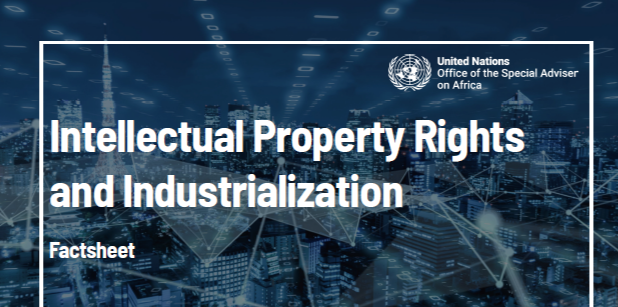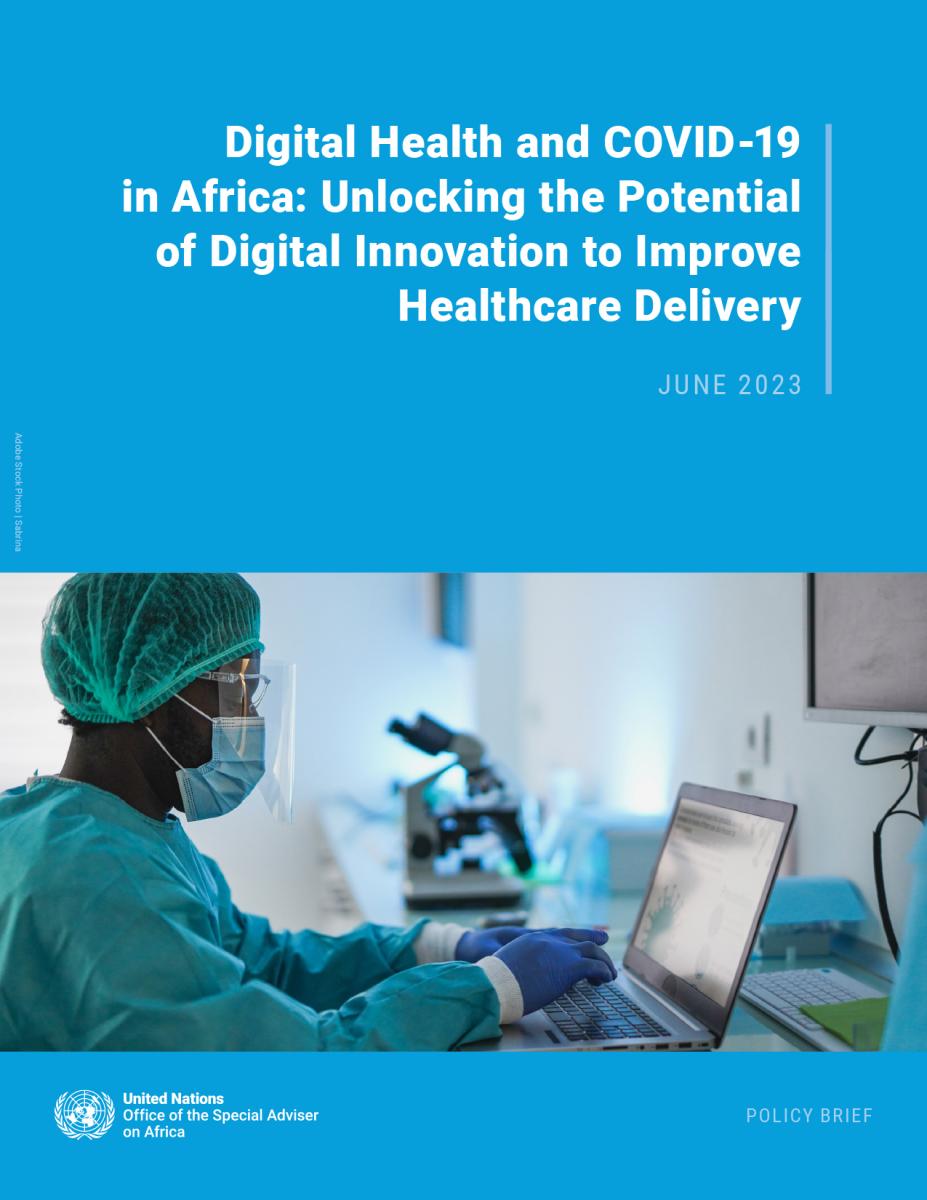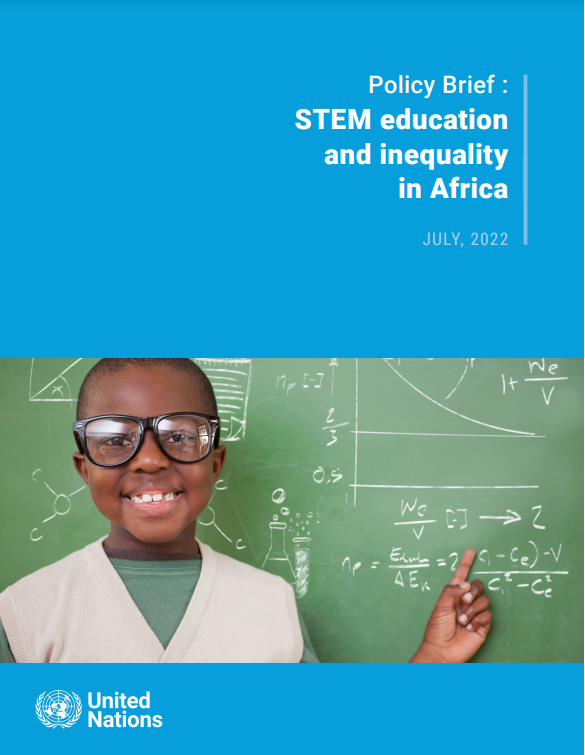Science, Technology and Innovation

A teacher delivers a class in a new science lab at Wambaa Secondary School in Pemba, Zanzibar UNOPSMoshi J. Lukindo
"A crisis is a terrible thing to waste," as Paul Romer, Stanford economist, once said. The present unprecedented crisis provides impetus for challenging the business-as-usual scenario and implementing decisions that underpin more sustainable and resilient societies. Key results of data analysis show that on average over the period 2000-2018, the share of exports of ICT products is 0.9% of Africa's total trade. Africa is the continent with the lowest percentage in terms of import and export of ICT goods. The COVID-19 pandemic has demonstrated the stark digital divide and poor level of connectivity in Africa. Due to COVID-19 pandemic-driven school closures, Africa’s youth lost access to education, opportunity, and livelihoods because technology became essential for study and work. African individuals, businesses, education institutions and governments need to be digitally enabled and connected. Beyond this, however, there is a challenge that is less frequently discussed - how Africa’s low participation in the intellectual property arena has served as a disincentive to innovation on the continent, including in the biomedical field, digital technology, agriculture and in other areas. In 2018, Africa’s share represented only 0.5% of the world’s patent applications, compared with 66.8% in Asia, 19% in North America and 10.9% in Europe
Publications
Factsheet: Intellectual Property Rights and Industrialization
 Industrialization is central to Africa’s long-term development prospects. However, the continent remains the least industrialized region globally, characterized by a narrow industrial base. South Africa is currently the only African country categorized as industrialized, while 45 out of 54 countries continue to rely heavily on the export of raw materials—particularly agricultural commodities, minerals, and fossil fuels. This underscores the urgent need for economic diversification through the promotion of scientific and technological innovation, supported by robust intellectual property (IP) rights protection.
Industrialization is central to Africa’s long-term development prospects. However, the continent remains the least industrialized region globally, characterized by a narrow industrial base. South Africa is currently the only African country categorized as industrialized, while 45 out of 54 countries continue to rely heavily on the export of raw materials—particularly agricultural commodities, minerals, and fossil fuels. This underscores the urgent need for economic diversification through the promotion of scientific and technological innovation, supported by robust intellectual property (IP) rights protection.
The advancement of science, technology, and innovation (STI) is a key driver of industrialization. IP rights are closely linked to this process, as they incentivize and protect innovation, thereby playing a critical role in fostering industrial development. Among the various forms of IP, patents, industrial designs, and utility models (or petty patents) are particularly relevant to industrial policy frameworks due to their applicability in protecting technical and design-related innovations.
This factsheet provides an overview of Africa’s industrialization landscape, exploring the linkages between innovation and industrial development through global and regional indexes. It also offers a snapshot of key industrialization-related IP indicators to inform policies aimed at leveraging IP for structural economic transformation.
Download:
Available in full colour (English)
The Indispensability of STEM for Sustaining Economic Growth in the 21st Century
This policy brief underscores the transformative potential of Science, Technology, Engineering, and Mathematics (STEM) education as a catalyst for Africa’s sustainable economic growth and its realization of the Sustainable Development Goals (SDGs) and Agenda 2063. By strategically investing in STEM education, Africa can address pressing challenges such as youth unemployment, inequality, and climate change while positioning itself as a global leader in innovation and economic resilience. Drawing lessons from transformative models in China, South Korea, and Singapore, the brief emphasizes the need for Africa to prioritize STEM-focused reforms. These include creating dynamic curricula, strengthening public-private partnerships, and integrating STEM policies across education and labour sectors. A forward-looking approach calls for governments to embed STEM across all education levels, improve efficiency in education financing, and foster ecosystems that link STEM education with industrial and technological innovation. By mobilizing domestic resources and leveraging STEM to build human capital, Africa can transition to a knowledge-based economy, enhance global competitiveness, and move up the global value chain. Such a commitment will accelerate inclusive development, making STEM a tool for economic transformation and a cornerstone for achieving "The Africa We Want."
Factsheet: Building Effective Patent Systems To Catalyze Local Innovation In Africa
This factsheet is based on the policy paper, Building Effective Patent Systems to Catalyze Local Innovation in Africa. This is the UN Office of the Special Adviser on Africa’s second publication by OSAA on Intellectual Property (IP) rights. The patent systems in Africa provide a potentially unique and important opportunity to promote local innovation. However, there is limited recognition and utilization of IP rights in general, and patents in particular, on the continent. The factsheet highlights eight key IP and other policy options that African policymakers and relevant stakeholders could pursue to address different challenges: 1) philosophical, 2) procedural, 3) substantive and 4) non-legal aspects of the patent systems on the continent.
Factsheet: The Case Studies on Intellectual Property (IP) Policymaking and Implementation in Promoting Agriculture in Africa”
This factsheet is pegged to the policy paper, The Case Studies on Intellectual Property (IP) Policymaking and Implementation in Promoting Agriculture in Africa. This is the UN Office of the Special Adviser on Africa’s third publication on IP rights. This knowledge product highlights existing national, regional, and international legal frameworks and the landscapes of African countries’ legal conditions in relation to promoting agriculture and food security in Africa. It focuses on three specific aspects: 1) Protection of Traditional Knowledge, 2) Protection of Farmers' Rights and Plant Breeders' Rights and 3) Digitalized Agriculture and Data Protection Laws, considering the important role played by small-scale subsistence farmers who form the backbone of Africa’s agricultural sector.
Investing in Science, Technology, Engineering and Math (STEM) Education to Build Africa’s Resilience against Climate Change
While African countries have signed climate agreements and developed policies and strategies to curb the negative impacts of climate shocks, these efforts sometimes overlook education’s role in equipping school children, youth, and communities to play an active role in mitigation and adaptation action. This policy brief advocates for promoting national and community-specific climate change literacy through STEM education - focusing on teaching skills for adaptation measures and building resilient infrastructure. Some topics covered include urban design, energy systems, water management, food systems, and localized data collection and analysis. These sectors need an influx of current and potential workforce equipped with specialized technical skills and capacities. Understanding the connections between STEM education and these areas is essential in proposing policy recommendations and curriculum changes to prepare young people for building climate-resilient communities.
Building Effective Patent Systems to Catalyze Local Innovation in Africa
This policy paper is the second installment by OSAA on intellectual property (IP) rights, titled "The Role of IP Rights in Promoting Africa’s Development." The advancement of Science, Technology, and Innovation (STI) is widely recognized as a crucial factor in achieving the goals outlined in the UN 2030 Agenda for Sustainable Development and the African Union’s Agenda 2063. IP rights play a significant role in advancing STI as they influence all stages of scientific, technological, and innovation processes. However, the recognition and utilization of IP rights, particularly patents, are limited across the African continent, reflecting the region's current IP culture.
The paper provides an in-depth analysis of the challenges facing patent systems in Africa, including philosophical, procedural, substantive, and non-legal issues. It also offers concrete policy recommendations for African member states, the private sector, and academics to better leverage patent systems, which hold unique and vital opportunities to promote local innovation in support of advancing STI and sustainable development.
The Case Studies on Intellectual Property Policymaking and Implementation in Promoting Agriculture in Africa
This policy paper is the second installment by OSAA on intellectual property (IP) rights, titled "The Role of IP Rights in Promoting Africa’s Development." The advancement of Science, Technology, and Innovation (STI) is widely recognized as a crucial factor in achieving the goals outlined in the UN 2030 Agenda for Sustainable Development and the African Union’s Agenda 2063. IP rights play a significant role in advancing STI as they influence all stages of scientific, technological, and innovation processes. However, the recognition and utilization of IP rights, particularly patents, are limited across the African continent, reflecting the region's current IP culture.
The paper provides an in-depth analysis of the challenges facing patent systems in Africa, including philosophical, procedural, substantive, and non-legal issues. It also offers concrete policy recommendations for African member states, the private sector, and academics to better leverage patent systems, which hold unique and vital opportunities to promote local innovation in support of advancing STI and sustainable development.
Empowering Tomorrow's Leaders Revolutionising Education in Africa for the Fourth Industrial Revolution and Beyond
In the rapidly evolving landscape of the Fourth Industrial Revolution (4IR), the significance of Science, Technology, Engineering, and Mathematics (STEM) education cannot be overstated. Nowhere is this more pertinent than in Africa, where the youth bulge presents both a challenge and an opportunity. As the continent strives for sustainable development, harnessing the potential of its burgeoning youth population through STEM education is essential not only for economic growth but also for social progress.
As Africa stands at the cusp of the Fourth Industrial Revolution, the imperative to invest in STEM education for its youth has never been clearer. By equipping young Africans with the skills and knowledge needed to thrive in the 4IR economy, STEM education not only generates decent jobs but also fosters innovation, entrepreneurship, and sustainable development. Through concerted efforts and collaborative partnerships, Africa can harness its demographic dividend to chart a path towards prosperity and inclusive growth in the digital age.
STEM Education in Africa: Paving the Way for Innovation and Growth
This factsheet on Science, Technology, Engineering, and Mathematics (STEM) education in Africa presents data and facts on how African Governments need to invest more in STEM. African Governments have recognized the critical role that STEM education can play in enhancing Science, Technology, and Innovation (STI) as enablers for addressing many challenges that the continent faces, such as poverty and inequalities, diseases, climate change impact, food and nutrition security, and digitization, among others.
However, African countries fall behind in STEM education outputs compared to the rest of the world. This lack of investment has led African countries to have limited capacity and output of technical skills training that is crucial for technicians and other related professions needed to support STI-based economic activities.
The fact sheet advocates for greater investment in STEM education, which can pave the way for scaling up African human capital development with a strong focus on leveraging technology and science and accelerating innovation. It recommends that African governments should address inefficiencies in public spending in the Education sector and should allocate earmarked funds for STEM programmes. Other recommendations to promote the investment in STEM education are presented in the fact sheet.
Digital Health and COVID-19 in Africa: Unlocking the Potential of Digital Innovation to Improve Healthcare Delivery.
The COVID-19 pandemic disrupted critical health services in Africa and undermined years of progress in fighting other diseases, such as HIV, Tuberculosis, and malar¬ia. In coping with these challenges, medical pro¬fessionals and facilities worldwide adopted tele¬health appointments to facilitate access to care and utilized big data and machine learning tools for COVID-related contact tracing and prevention.
The pandemic has provided an unprecedented opportunity for African countries to harness the potential of digitalization and technological inno¬vation to strengthen their public health systems with a forward-looking approach and improve the well-being of their citizens against future outbreaks. This policy brief highlights the important digital health tools implemented by African countries and provide recommendations on future priority policy actions by African governments and the UN system to catalyze digital innovation for public health.
STEM education and inequality in Africa
This policy brief aims to assess how inequalities in the education sector undermine Africa’s capacity to leverage the potential of Science Technology Engineering and Mathematics (STEM) education for sustainable development. It assesses structural problems that limit the impact of education policies and analyses inequality from a triple perspective: income, geographic location (urban/rural divide) and gender. It highlights that for STEM education to become a more significant driver for Africa’s global economic competitiveness, African countries need to address the existing inequalities embedded in the education sector and that undermine the strengthening of the continent's human capital. It proposes recommendations on how to advance and strengthen the implementation of STEM education in Africa by addressing these inequalities.
The Role of Intellectual Property Rights (IPRs) in promoting Africa’s Development
This paper aims at providing an overview of intellectual property rights (IPRs) in Africa and it is the first of a series of three policy papers under the overall title of “the role of IPRs in promoting Africa’s development”. The paper outlines the basic concept of IPRs in selected areas such as health, agriculture and industrialization in which IP could potentially play an important role to promote sustainable development. It examines the importance of IPRs, which could be leveraged as a tool to facilitate Africa’s development through providing incentives to inventors and creators as well as facilitating disclosure of knowledge and the transfer of technology and know-how. IPRs are one of key elements of Science, Technology and Innovation (STI), which is an important cross-cutting enabler for the implementation of United Nations (UN) 2030 Agenda for Sustainable Development and African Union (AU)’s Agenda 2063.
Science, Technology, Engineering and Mathematics (STEM) as an Enabler for Development and Peace
 Strong evidence suggests that Science, Technology, Engineering and Mathematics (STEM) can be important determinants of a country’s economic development and contribute to peace and security. The Office of the Special Adviser on Africa (OSAA), through its Africa Knowledge Network Working Group for STEM produced this policy paper to illustrate the role of STEM education in enabling development and peace in Africa.
Strong evidence suggests that Science, Technology, Engineering and Mathematics (STEM) can be important determinants of a country’s economic development and contribute to peace and security. The Office of the Special Adviser on Africa (OSAA), through its Africa Knowledge Network Working Group for STEM produced this policy paper to illustrate the role of STEM education in enabling development and peace in Africa.
The paper highlights that STEM education is critical for creatively developing solutions and innovations that Africa needs for sustainable development. It examines the current status of STEM in Africa and notes that although there has been progress in access and quality of STEM Education, with significant examples of good practices and impacts, visible outputs from scientific productivity and knowledge systems are still below acceptable levels. This underscores the need for a holistic and multidisciplinary approach to promote STEM education in order to record significant development in Africa. The policy paper also explores how existing frameworks and strategies in promoting science, technology, innovation (STI) and STEM education are being implemented at policy and grassroots levels to support the implementation of the African Union Agenda 2063 and the United Nations 2030 Agenda for sustainable development. Read the policy paper in English.











